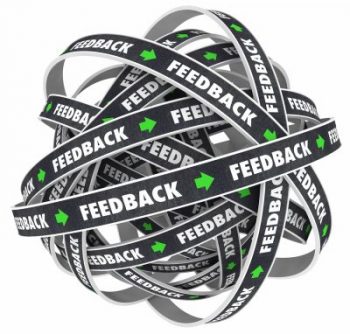Perhaps leaders aren’t making the best use of feedback conversations. As a leader, your ability to make sense of greater levels of complexity continues throughout your career and has a significant impact on both your leadership development and business results. And yet, from what I’ve observed and experienced, leaders aren’t using feedback conversations to learn what’s needed.
Feedback has a poor reputation. Few leaders know how to deliver it well; it is often poorly handled and sometimes avoided until too late. Instead of setting up feedback conversations that act as a learning loop, leaders are delivering one-way messages. People are seen as problems to be corrected instead of sources of information.
But in a complex world of business today, everyone should be learning. Feedback is essential, and those organizations and teams that actively engage with feedback loops are able to make decisions and adjustments to thrive in a rapidly changing world.
I am fascinated by the ideas found in the book Simple Habits for Complex Times: Powerful Practices for Leaders by Jennifer Garvey Berger and Keith Johnson (Stanford Business Books, 2015) and want to share with you here some of the ideas on feedback.
I think most people agree that giving and receiving feedback is never easy, but we need to learn to do it well. The health and success of our careers and our people depend on it. Here’s what Berger and Johnson suggest leaders ask themselves when faced with giving feedback to someone:
- What if this person weren’t a problem for me to solve, but a key knowledge holder for me to understand?
- What is it this person knows about the situation that could shift or change my mind and how might I find this out?
The mindset leaders need to adopt when approaching a feedback conversation is “What do I have to learn here,” and not how to get someone to correct or change. That may also be needed but before that there needs to be more complete information sharing. The idea is not to see “people as problems,” but to see “people as sensemakers.”
Leaders need to ask different questions in order to gain a more complete understanding of the situation and the people involved before they can give feedback in ways that other people can hear. When leaders take time to learn more, they become better leaders because feedback becomes a learning loop.
My question is this: Are you someone who jumps into feedback conversations with the problem and the solution? Many of us were trained to do it that way. But how can we be sure our suggestions are appropriate before we ask questions and seek out more information?
Before one can engage well in feedback conversations, leaders need to check their mindset first and set themselves up for learning. What do you think? I’d love to hear from you. I can be reached here or on LinkedIn.

Did You Enjoy This Article?
Join thousands of other smart business owners like yourself & get our Proffittable Times newsletter.
It's filled with actionable content you can apply immediately.
Sign up now to get started!
– Coach Nancy










